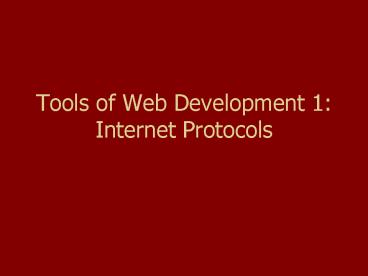Tools of Web Development 1: Internet Protocols
1 / 15
Title:
Tools of Web Development 1: Internet Protocols
Description:
Computer Science Department's Web Server. IP Addresses vs. URLs ... .mil Military Entity .com Commercial Entity .net Internet Service Provider. ... –
Number of Views:35
Avg rating:3.0/5.0
Title: Tools of Web Development 1: Internet Protocols
1
Tools of Web Development 1Internet Protocols
2
Goals
- Understand what a protocol is.
- Understand how TCP/IP works.
- Understand how IP addresses work.
- Understand what domain names are.
- Understand the different protocols available on
the Internet.
3
When Computers Communicate
- When two or more computers communicate, they must
have a common way in which to communicate. - To do this computers use protocols
- A protocol is an agreement by which two or more
computers can communicate. - Transfer Control Protocol/Internet Protocol is
the underlying protocol for the Internet.
4
How TCP/IP Works
- 1) Transfer Control Protocol (TCP) breaks data
into small pieces of no bigger than 1500
characters each. These pieces are called
packets.
10101010100110101001101001101021010101010101101011
11010101110111011101101100001011101101010101010011
10101001010111101000
101010101001101010011010011
101010101001101010011010011
101010101001101010011010011
5
How TCP/IP Works
- 2) Each packet is inserted into different
Internet Protocol (IP) envelopes. Each
contains the address of the intended recipient
and has the exact same header as all other
envelopes.
101010101001101010011010011
101010101001101010011010011
101010101001101010011010011
6
How TCP/IP Works
- A router receives the packets and then determines
the most efficient way to send the packets to the
recipient. - After traveling along a series of routers, the
packets arrive at their destination.
7
How TCP/IP Works
- Upon arrival at their destination, TCP checks the
data for corruption against the header included
in each packet. If TCP finds a bad packet, it
sends a request that the packet be
re-transmitted.
8
IP Addresses
- Since computers process numbers more efficiently
and quickly than characters, each machine
directly connected to the Internet is given an IP
Address - An IP address is a 32-bit address comprised of
four 8-bit numbers (28) separated by periods.
Each of the four numbers has a value between 0
and 255
9
IP Addresses
- Example of an IP Address
http//134.68.140.1/
The IP Address of the Computer Science
Departments Web Server
10
IP Addresses vs. URLs
- While numeric IP addresses work very well for
computers, most humans find it difficult to
remember long patterns of numbers. - Instead, humans identify computers using Uniform
Resource Locators (URLs), a.k.a. Web Addresses.
11
IP Addresses vs. URLs
- When a human types a URL into a browser, the
request is sent to a Domain Name Server (DNS),
which then translates the URL to an IP address
understood by computers. - The DNS acts like a phonebook.
12
Anatomy of a URL
13
What about Email Addresses?
jstudent_at_cs.iupui.edu
sub-sub domain
domain name
username
sub-domain
14
Top Level Domain Names
.edu Educational Institution .gov Governmental
Agency .mil Military Entity .com Commercial
Entity .net Internet Service Provider .org Non-P
rofit Organization
15
Internet Protocols
http// World Wide Web mailto E-mail
address ftp// File Transfer Protocol telnet Te
lnet































